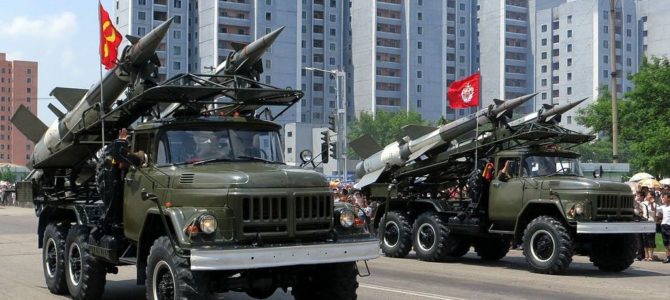
Perhaps nowhere in American foreign policy is the definition of insanity demonstrated more frequently than in how the United States approaches North Korea: We’ve tried the same things, and are still talking about trying them again, but expect the result to change.
For a quarter-century under multiple despotic Kim regimes, Pyongyang’s incremental steps toward nuclear weapons and intercontinental missiles stir predictable hand-wringing in Washington and policy circles. With every North Korean missile launch, nuclear test, and broken agreement, a familiar cast of experts emerges to offer the same solutions: sanctions and diplomatic “pressure” to get Pyongyang back to the “negotiating table.”
Perhaps under the prior Kim Jong Il regime, in which the North’s nuclear pursuits were insincerely put on that table to extract concessions from the West, the sanctions and diplomatic approaches made some sense, at least on the surface. Putting aside the reality that Kim Jong Il never seriously intended to permanently abandon nuclear weapons and only appeared to be open to doing so to gather goodies and buy time, recent events make it clearer than ever that North Korea will never negotiate its weapons of mass destruction program. As such, the time has come for the United States to stop talking about talking.
North Korea Will Never Give Up on Nukes
Pyongyang knows that a nuclear capability, and the threat of delivering it via intercontinental ballistic missile to U.S. territory, is its only chance to deter a war it knows it will lose. Accurately or not, Kim Jong Un, like his father and grandfather before him, lives in fear of being toppled by external forces. Nukes are the best available insurance against that happening.
While this fear explains North Korea’s weapons pursuit despite years of sanctions and increasing international isolation, it also provides insight for how the United States should respond. Because Kim Jong Un’s primary goal is to stay in power, Washington can be assured of two things. One, Pyongyang isn’t giving up its nukes without a war. Second, Pyongyang wants to avoid that war.
The United States also wants to avoid war on the peninsula, which would be catastrophic, especially for South Korea. This leaves Washington in a tough spot, and reaching for the old standbys of sanctions and talks. Instead, it’s time to take measures that have less to do with getting Kim to engage in diplomacy, and more to do with showing resolve and preparing for the unthinkable.
With negotiated denuclearization impossible, we must leverage Pyongyang’s fear of regime collapse by taking a stronger security stance and signal that we are willing to fight. Washington can still pursue sanctions, but would best give up the foolish belief that it will get Kim Jong Un to negotiate his weapons programs. The United States needs to take a military deterrence posture and accept the fact that unless Kim is removed from power, North Korea will have nuclear weapons, and probably the capability to deliver them to much of the U.S. homeland.
Here’s What We Should Do
Specifically, the United States should increase its military presence on the peninsula, continue deploying missile defense systems, and strongly consider returning tactical nuclear missiles to South Korea. These moves would no doubt anger China, send North Korean propaganda into a tizzy, and engender consternation among those calling for more sanctions and negotiations. But Pyongyang should be put on notice with more than words that at the first sign of North Korea’s use of nuclear weapons or attack on the United States or its allies, it’s game on—including our use of nuclear weapons.
The good news is that the North is extremely unlikely to purposely start a war, and would probably only use its nuclear weapons first if it thought a U.S. strike was underway.
President Trump has two advantages in taking this approach that previous presidents didn’t. First, he is unpredictable. This is an aspect of Washington’s approach to North Korea that has been sorely lacking, and likely unnerves Kim in a way that President Obama never did. Trump’s unpredictability and rhetoric provide a sharper edge to beefed-up military deterrence moves.
The second advantage Trump has is his America-first foreign policy and a rejection of unnecessary foreign wars. Although this has recently been drawn into question by his conventional Bush-Obama retread strategy in Afghanistan and the departures of Steve Bannon and Sebastian Gorka from the White House, Trump has long spoken of war policy more amenable to conservatives and libertarians weary of neo-con adventurism.
While Trump’s unpredictability may make Kim Jong Un anxious, his hesitation to get drawn into military police actions should assuage those worried about an unprovoked preemptive strike. Of course, this assumes Trump’s unpredictability—and military advisers now almost uniformly cut from conventional Washington cloth—don’t override the America-first philosophy and lead us into attacking first. If they do not, a president who puts Pyongyang on edge but prefers not to start wars is exactly the type of U.S. leader who can credibly and responsibly pull off a stronger military posture on the Korean peninsula.
With decades of repeated and failed approaches behind us and an adversary unwilling to give up the only card it can play, the United States must hope for the best, prepare for the worst, and stop believing past efforts will finally work this time.









